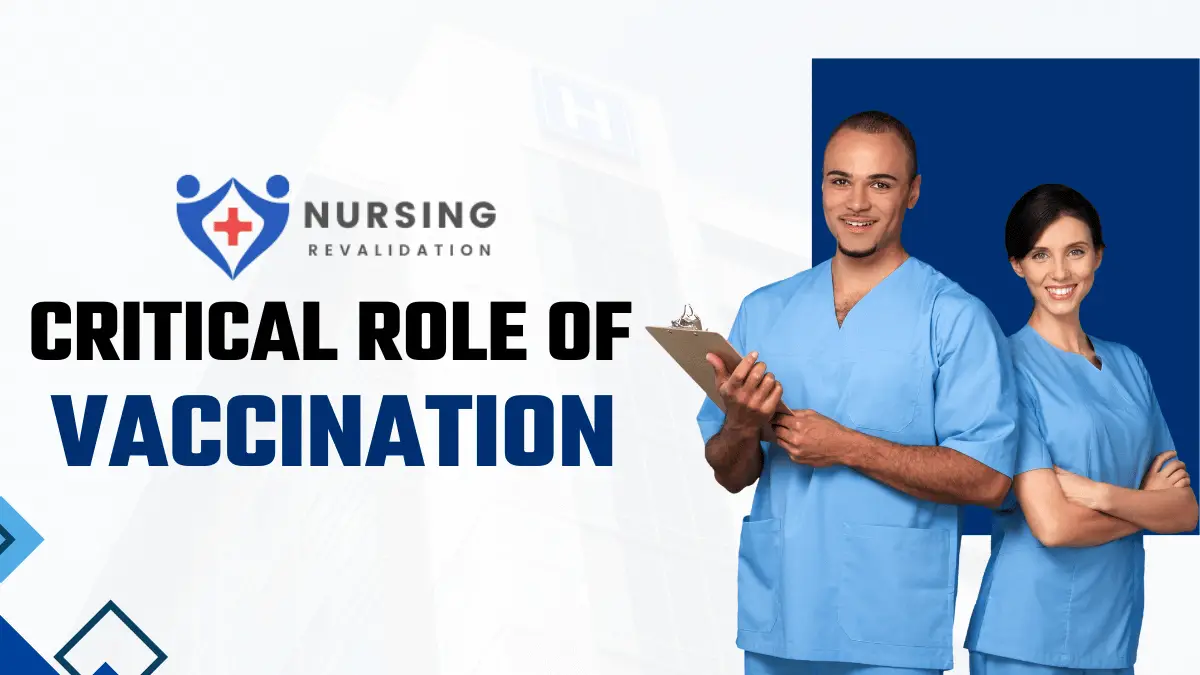In the realm of healthcare, few interventions have had as profound an impact on public health as vaccination. As frontline healthcare providers, nurses play a pivotal role in advocating for and administering vaccines. This comprehensive guide explores the importance of vaccination from a nursing perspective, delving into its significance, benefits, challenges, and best practices.
Understanding Vaccination
Vaccination: A Pillar of Public Health
Vaccination stands as one of the most effective strategies for preventing infectious diseases. By stimulating the body’s immune system to produce antibodies, vaccines confer immunity against specific pathogens, reducing the likelihood of infection and transmission within communities.
Herd Immunity and Community Protection
Nurses understand the concept of herd immunity – the indirect protection afforded to individuals when a significant proportion of the population is immune to a disease. This concept underscores the importance of widespread vaccination, as it not only safeguards individuals but also shields vulnerable populations who may be unable to receive vaccines due to medical reasons.
Types of Vaccines
Nurses are familiar with the various types of vaccines, including live attenuated, inactivated, subunit, conjugate, and mRNA vaccines. Each type has its unique mechanism of action and considerations for administration, requiring nurses to stay updated on the latest recommendations and guidelines.
Table: Vaccine Schedule for Common Infectious Diseases
| Vaccine | Recommended Age | Dosage | Route of Administration |
|---|---|---|---|
| MMR (Measles, Mumps, Rubella) | 12-15 months, 4-6 years | 0.5 mL | Subcutaneous injection |
| DTaP (Diphtheria, Tetanus, Pertussis) | 2, 4, 6, 15-18 months, 4-6 years | 0.5 mL | Intramuscular injection |
| IPV (Inactivated Poliovirus Vaccine) | 2, 4, 6-18 months, 4-6 years | 0.5 mL | Intramuscular injection |
| Hepatitis B | Birth, 1-2 months, 6-18 months | 0.5 mL | Intramuscular injection |
| Varicella (Chickenpox) | 12-15 months, 4-6 years | 0.5 mL | Subcutaneous injection |
The Role of Nurses in Vaccination
Patient Education and Counseling
One of the primary responsibilities of nurses is to educate patients and their families about the importance of vaccination. Nurses possess the communication skills and clinical expertise necessary to address misconceptions, alleviate concerns, and promote informed decision-making regarding vaccines.
Vaccine Administration and Safety
Nurses are trained in vaccine administration techniques, ensuring the safe and accurate delivery of vaccines. They adhere to strict protocols for handling, storage, and disposal of vaccines to maintain their efficacy and prevent adverse reactions.
Monitoring Vaccine Efficacy and Adverse Reactions
Nurses play a crucial role in monitoring vaccine efficacy and identifying adverse reactions. Through vigilant surveillance and reporting, nurses contribute to post-marketing surveillance efforts, enhancing our understanding of vaccine safety profiles and informing public health policies.
Navigating Vaccine Hesitancy
Addressing Vaccine Hesitancy
Despite the overwhelming evidence supporting the safety and efficacy of vaccines, vaccine hesitancy remains a significant barrier to achieving optimal immunization coverage. Nurses are at the forefront of addressing vaccine hesitancy, employing empathy, compassion, and evidence-based information to build trust and confidence in vaccines.
Combatting Misinformation
In an era of rampant misinformation, nurses serve as trusted sources of accurate and reliable information. By debunking myths and dispelling falsehoods surrounding vaccines, nurses empower individuals to make informed decisions based on scientific evidence and consensus.
Conclusion
In conclusion, vaccination represents a cornerstone of public health, and nurses are instrumental in its implementation and success. By leveraging their expertise, compassion, and commitment to patient care, nurses play a vital role in promoting vaccination uptake, protecting individuals, and safeguarding communities against infectious diseases. As we navigate the evolving landscape of healthcare, let us reaffirm our commitment to vaccination as a powerful tool for disease prevention and health promotion.

